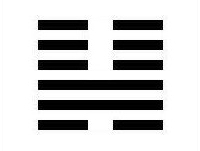
Hexagram 46 - Sheng / Pushing Upward - James Legge Translation

- Above K'un the Receptive, Earth
- Below Sun the Gentle, Wind, Wood.
Meaning
Sheng indicates that under its conditions there will be great progress and success. Seeking by the qualities implied in it to meet with the great man, its subject need have no anxiety. Advance to the south will be fortunate.
Meaning Commentary
The character Sheng is used of advancing in an upward direction, advancing and ascending. And here, as the name of the hexagram, it denotes the advance of a good officer to the highest pinnacle of distinction. The second line, in the centre of the lower trigram, is strong, but the strength is tempered by its being in an even place. As the representative of the subject of the hexagram, it shows him to be possessed of modesty and force. Then the ruler's seat, the fifth place, is occupied by a divided line, indicating that he will welcome the advance of 2. The officer therefore both has the qualities that fit him to advance, and a favorable opportunity to do so. The result of his advance will be fortunate.
It is said that after he has met with the ruler, the great man in 5, advance to the south will be fortunate. Ku Hsi and other critics say that advancing to the south is equivalent simply to advancing forwards. The south is the region of brightness and warmth; advance towards it will be a joyful progress.
<-Prev Next->The Image
Within the earth, wood grows: The image of Pushing Upward. Thus the superior man of devoted character heaps up small things in order to achieve something high and great.
Image Commentary
Adapting itself to obstacles and bending around them, wood in the earth grows upward without haste and without rest. Thus too the superior man is devoted in character and never pauses in his progress.
King Wans explanation
- We find the weak line, as it finds the opportunity, ascending upwards.
- We have the attribute of flexibility and that of obedience; we have the strong line below and its proper correlate above: these things indicate that there will be great progress and success.
- Seeking by the qualities implied in Sheng to meet with the great man, its subject need have no anxiety there will be ground for congratulation.
- Advance to the south will be fortunate: his aim will be carried out.
Legge Footnotes on King Wans explanation
The explanation of the first paragraph has given occasion to much difference of opinion. Some will have 'the weak line' to be 4; some 5; and some the whole of K'un, the upper trigram. The advocates of 4, make it come from hexagram 40, the weak 3 of which ascends to the strong 4, displaces it, and takes its place; but we have seen repeatedly the folly of the doctrine of changing lines and figures. The great symbolism of Appendix II suggests the proper explanation. The lower trigram, Sun, represents here not wind but wood. The first line, weak, is the root of a tree planted beneath the earth. Its gradual growth symbolizes the advance upwards of the subject of the hexagram, fostered, that is, by the circumstances of the time.
The Lines
The first SIX, divided, shows its subject advancing upwards with the welcome of those above him. There will be great good fortune.
Line 1 is weak, where it should be strong its subject, that is, is humble and docile. Those above him, therefore, welcome his advance. Another interpretation of the line is suggested by Appendix I; which deserves consideration. As the first line of Sun, moreover, it may be supposed to concentrate in itself its attribute of docility, and be the lord of the trigram.
The second NINE, undivided, shows its subject with that sincerity which will make even the small offerings of the vernal sacrifice acceptable. There will be no error. See on the second line of hexagram 45 Ts'ui .
Line 2 is strong, and the weak 5 is its proper correlate. We have a strong officer serving a weak ruler; he could not do so unless he were penetrated with a sincere and devoted loyalty.
The third NINE, undivided, shows its subject ascending upwards as into an empty city.
Paragraph 3 describes the boldness and fearlessness of the advance of the third line. According to the Khang-hsi editors, who, I think, are right, there is a shade of condemnation in the line. Its subject is too bold.
The fourth SIX, divided, shows its subject employed by the king to present his offerings on mount Khi. There will be good fortune; there will be no mistake.
Line 4 occupies the place of a great minister, in immediate contiguity to his ruler, who confides in him, and raises him to the highest distinction as a feudal prince. The mention of mount Khi, at the foot of which was the capital of the lords of Kau, seems to take the paragraph out of the sphere of symbolism into that of history. The king in it is the last sovereign of Sheng; the feudal prince in it is Wan.
The fifth six, divided, shows its subject firmly correct, and therefore enjoying good fortune. He ascends the stairs with all due ceremony.
In line 5 the advance has reached the highest point of dignity, and firm correctness is specially called for. Ascending the steps of a stair may intimate, as Ku Hsi says, the ease of the advance; or according to others the Khang-hsi editors among them, its ceremonious manner.
The sixth six, divided, shows its subject advancing upwards blindly. Advantage will be found in a ceaseless maintenance of firm correctness.
What can the subject of the hexagram want more? He has gained all his wishes, and still he is for going onwards. His advance is blind and foolish and only the most exact correctness will save him from the consequences.
